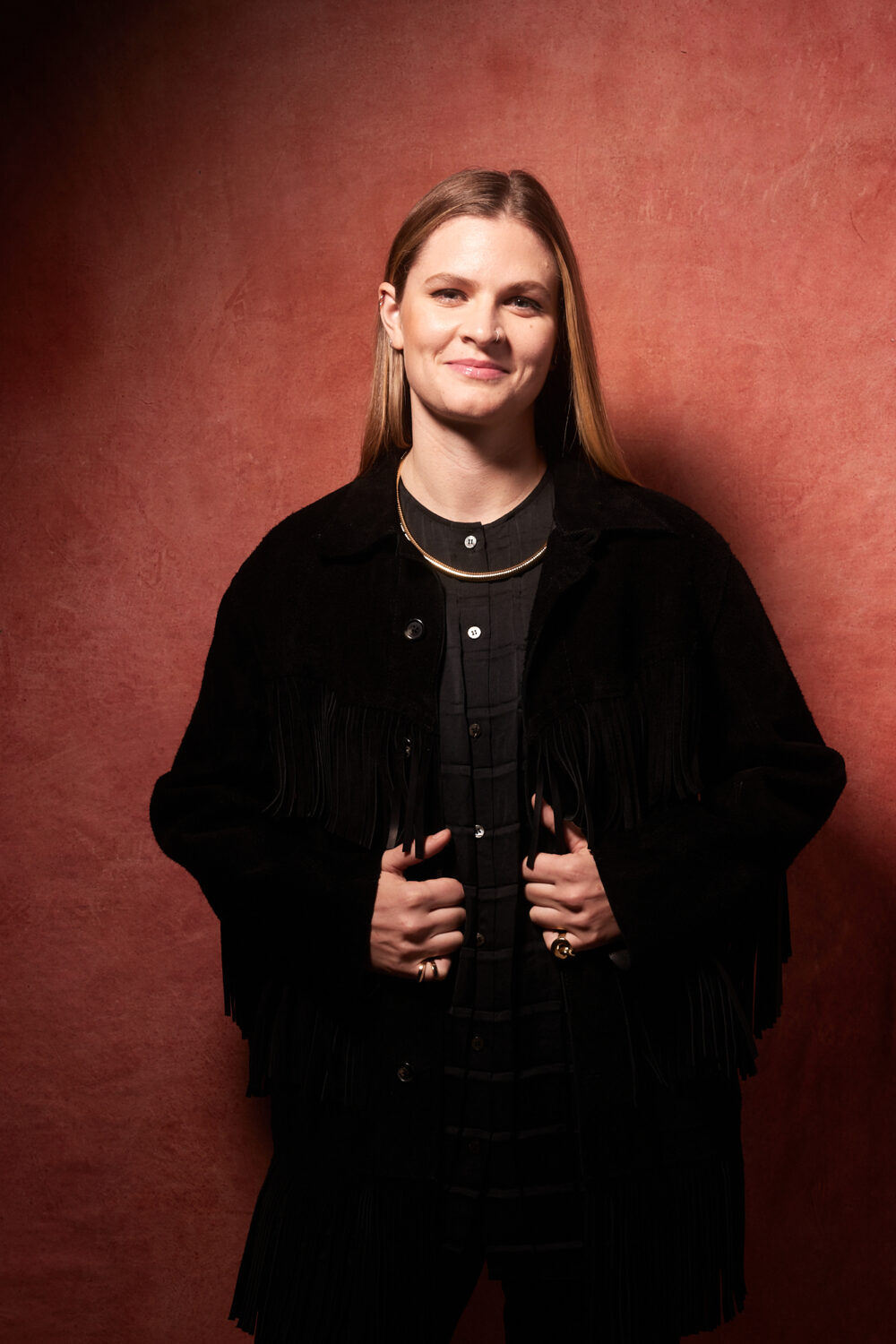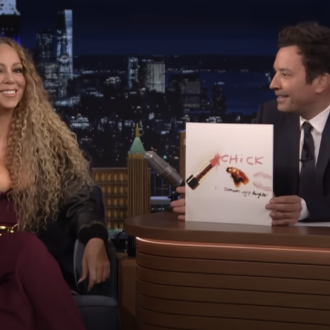Nicole Glover Reflects

Ebru Yildiz
Nicole Glover is always thinking. The 36-year-old saxophonist, who grew up in Portland, OR, speaks the way she plays: with confidence and without hesitation. Every question I asked when we spoke by phone earlier this month generated a thoughtful, multi-paragraph response, and her approach to her music is as considered as her solos.
Glover has just released her third album as a leader — it’s called Memories, Dreams, Reflections, and the liner notes reveal that it shares that title with legendary psychoanalyst Carl Jung’s autobiography. There’s also a track on the album called “No. 2,” which is a Jungian term for “inner being,” the introspective side of one’s personality. Glover didn’t write the piece; it’s by drummer Lawrence Williams. That’s a whole other thing which we’ll get into below.
Memories, Dreams, Reflections is the second album by Glover’s working trio of bassist Tyrone Allen II and drummer Kayvon Gordon. They recorded it at the Rudy Van Gelder studio in New Jersey and produced it themselves. (Their previous album, 2024’s Plays, was also recorded at Van Gelder’s, but with trumpeter Jeremy Pelt producing.)
Memories… is a confident record, the sound of a band that knows itself inside and out. It’s freer than Plays, but it’s not “free jazz.” It’s just that the musicians allow themselves to stretch the compositions farther than they might have done a few years earlier. It’s the kind of record where a band tells you exactly who they are. Think JD Allen’s Victory! or Branford Marsalis’s Crazy People Music or Dexter Gordon’s Go.
“I think that this record is my most personal,” Glover says. “And I say that for a variety of reasons.” She explains that “when we started as a group, it was really because I just loved [Tyrone and Kayvon] both so much as people and as musicians, and I really just wanted to put it together and see what would happen. I didn’t necessarily have some grand concept when I started the group other than, I want to play with these guys.”
Because of that open-minded initial idea, the trio became a sort of work space where they could explore compositions — their own, and others’. “For the first bit of time that we were a band, the concept really was, any tune that you have always maybe wanted to play, but have never had an opportunity or the right situation or whatever to play it, bring it in. Let’s play that.” Thus, Plays. “It was just us playing tunes. Here’s what we’ve been up to. Here’s the tunes. Here’s what we sound like playing on a tune together.” (It’s worth noting that the trio were joined on Plays by vibraphonist Steve Nelson, and on Memories… by cellist Lester St. Louis.)
Memories… is different. While Plays featured old if relatively little-known pieces by artists like McCoy Tyner, Kenny Dorham, Ornette Coleman, and Elmo Hope, almost all the tracks on the new record are by the members of the group (Glover wrote two, Allen one) or players of their generation like pianists Miki Yamanaka and Lex Korten, bassist Jaribu Shahid, and drummer Lawrence Williams.
“Now I have a sense of kind of what we do together. And now I have a sound in my ear of this group,” Glover explains. “So then the repertoire selection became… a little bit more personal. Me, Tyrone, and Kayvon all brought stuff to the situation. And a lot of our friends’ music; several of the pieces on there are songs written by our friends. And so that was fun for us. And I think fun for the peers whose music we recorded, too.”
She agrees that the music on Memories… is more abstract than that on Plays, but “everything is based on — even the more abstract pieces, you know… there’s clear thematic material and each tune to me is kind of its own world, right? And it has its own sound and it has its own sonic landscape. And so I think that even on the more abstract pieces, there’s still a sense of that.”
What comes through when listening to Glover play is that she has a deep knowledge of jazz and a keen interest in all its sides. “I love swing. I love avant-garde. I love it all. And I always have. And I never wanted to be seen as only having my foot in one space. Because I’ve never had my foot in one space, at least to me. Not in my heart, not in my mind.”
That open attitude has led her to a range of places. Her first recorded appearance was as part of the American Music Program, formerly known as the Pacific Crest Jazz Orchestra. She’d seen them in concert as a teenager and been powerfully affected by the sight of, in her words, “kids my age just dealing with the music. I mean, they were playing on a level that at my age just astounded me.” She auditioned for the group and was admitted, and learned — not just from the instructors but from her fellow students — that jazz was more than the John Coltrane and Duke Ellington records she’d found in her father’s collection. “That’s how I learned about Branford Marsalis and Chris Potter, Brad Mehldau, you know, all these people that I was completely unaware of… they were in this world that I had no idea about. I joined that program. I started going to the local library and checking out like 25 CDs at a time and all of that. And I just never looked back; that really was a huge turning point in my life, just finding out that this was even a possibility.”
The American Music Program was invited to record with Esperanza Spalding, who was an alumnus, for her album Radio Music Society. “At the time that I participated in those sessions, I believe it was after I was out of high school, out of that program. But they had, in addition to the students who were currently in that program, some alumni from the program join them for the session and also for a concert as well. I believe that we ended up performing that music in Portland with Esperanza… because she had the same teacher. She’s from Portland as well.”
Glover has since participated in dozens of recording sessions with artists including trumpeter David Weiss, pianists George Colligan and Art Hirahara, and vibraphonist Behn Gillece, among others. She delivered a beautifully old-school solo on “Cancer,” the fourth movement of pianist Aaron Diehl’s orchestral recording of Mary Lou Williams’ Zodiac Suite. And for the past few years, she’s been a member of the all-female sextet Artemis, taking over the tenor saxophone chair from Melissa Aldana.
“Everybody involved in the situation, including Melissa, all gave me a lot of support and encouragement. And they all said the same thing, which is ‘Be you.’ Melissa and I are very different players, and I couldn’t even, if I tried to play like Melissa I couldn’t, you know.” But her five years to date in the group — she’s appeared on 2023’s In Real Time and this year’s Arboresque — have been a strong crucible. “I think that I’ve grown up a lot in that band. I think that I’m more confident in what I’m hearing than I used to be. I’m more confident in not being afraid to take risks and to contribute what I’m feeling like contributing… trying to really stand by it and say, well, that’s what it was tonight.”
Artemis also provides Glover with a chance to play with musicians decades her senior — pianist Renee Rosnes and trumpeter Ingrid Jensen have been on the scene since the ’80s and ’90s, respectively. That’s a valuable opportunity, and one that’s less and less common as jazz elders retire from the road… or leave the planet entirely. Meanwhile, her own group is made up of players her own age, or even younger. But each member of the trio takes other opportunities as well. “And what I think is beautiful is that we all have these things that we’re involved with. We’re all playing with older musicians. And we’ll go out separately and we’ll play with these people and learn. And then we come together and kind of bring what we’ve learned to the situation… we bring that to the trio and we kind of use it to develop a sound.”
Glover believes that each side is equally important — she describes jazz as an ecosystem, where each element is just one part of a whole. “I think when you’re playing with your friends, there’s a little bit of this fearlessness in a way, because it’s your friends. And you can bring that fearlessness to the bandstand with you when you’re playing with the elders, because something that I’ve learned in playing with some of the people that I’ve been playing with, like Christian McBride or Renee Rosnes, is that I was so nervous to play with them that it took me a while to realize that they really want me to just play. They really want me to try things and take risks and go for it. I think that these people have a way of almost hearing past where you’re at. It’s like they hear where you’re at and they hear where you’re going. And they’ve given me grace, and an opportunity to explore that with them, which is just a gift, you know.”
TAKE 10
Dan Weiss - "Holotype"
Drummer Dan Weiss composed all the pieces on his new album specifically for the quartet of trumpeter Peter Evans, vibraphonist Patricia Brennan, and guitarist Miles Okazaki. The music has deep resonance and a leaping energy, and the balance struck between melodic improvisation and ultra-precise bomb-dropping is astonishing. All four players are absolute masters — Evans can make a trumpet do anything he wants, Brennan has dragged her instrument far outside the boundaries of what anyone before her has attempted, and Okazaki charges forward without ever leaving the listener behind. On “Holotype,” they weave a glittering web together, ascending into the sky and dancing on the strings, but when Weiss is left alone at the halfway mark, he begins a drum solo that’s so melodic and rhythmically exact it reminds me of Max Roach’s solo on “Mildama,” from the 1955 Clifford Brown/Max Roach Quintet album Brown And Roach Incorporated. Oh yeah. (From Unclassified Affections, out now via Pi Recordings.)
Emmeluth/Håker Flaten/Filip - "Stone Cold"
This is an all-star group, at least within the context of European avant-garde jazz. Danish alto saxophonist Signe Emmeluth leads her own punkish free jazz quartet, Emmeluth’s Amoeba; Norwegian bassist Ingebrigt Håker Flaten has been part of a thousand projects but may be best known for his tenure in The Thing with saxophonist Mats Gustafsson and drummer Paal Nilssen-Love; and drummer Axel Filip is an Argentinian drummer resident in Berlin, who works frequently with saxophonist Camila Nebbia. Evan Parker once wrote of his music, “We operate without rules (pre-composed material) or well-defined code of behavior (fixed tempos, tonalities, serial structures, etc.), and yet are able to distinguish success from failure.” That’s exactly what’s going on here. The music starts from absolutely nowhere, perhaps from pure sound itself, and it somehow congeals and moves forward, and reaches not only a collective climax but a natural stopping point, again and again. (From Hyperboreal Trio, out now via Relative Pitch.)
Danny Grissett - "Wonder Wander"
Pianist Danny Grissett and bassist Vincent Archer have been working together for something like 20 years; on Grissett’s first three albums, they were joined by drummer Kendrick Scott. He was succeeded by Marcus Gilmore for one album, but Bill Stewart took over in 2015 and has anchored the group ever since. Sometimes they’re joined by a saxophonist (Walter Smith III, Dayna Stephens), but Travelogue, Grissett’s seventh album, is a simple trio date. Almost all the compositions are originals, except for two standards, “Whisper Not” and “Here’s That Rainy Day.” His piano style is very clean and pretty, perfect for mature, sophisticated modern jazz of this type. There are no sudden dissonant notes, no Thelonious Monk-esque clangs or Matthew Shipp-style rumbles. His playing reminds me of the work of the late Kenny Kirkland, who worked with both Wynton and Branford Marsalis. Archer and Washington provide a subtle, refined swing throughout. (From Travelogue, out now via HighNote.)
Behn Gillece - "Stranded In Elizabeth"
Vibraphonist Behn Gillece has been making albums for Posi-Tone for more than 15 years; this is his eighth release as a leader, following four albums with tenor saxophonist Ken Fowser. Here, he’s joined by Willie Morris on tenor, Jon Davis on piano, Boris Kozlov on bass, and two different drummers: Rudy Royston for most of the first half, and Jason Tiemann for most of the second. “Stranded In Elizabeth” is a piece Gillece originally recorded on 2013’s Top Shelf, his fourth and final album with Fowser, and it’s named for the New Jersey town where I lived for 30 years before moving to Montana, so I had to check it out for this column. It’s an uptempo, bluesy piece with a nice, hummable hook; Davis’s piano anchors it, and Gillece provides filigreed adornment. But I don’t know; when I lived in Elizabeth, I heard a whole lot more bachata than hard bop. (From Pivot Point, out now via Posi-Tone.)
Tropos - "The Best Donuts In Pennsylvania"
When Tropos first appeared on record on 2020’s Axioms // 75ab, they were a quintet (alto sax, piano, bass, drums and vocals) performing original music alongside reworkings of Anthony Braxton compositions. By 2023’s Shadow Music, they were down to a trio, then on 2024’s At 411 Kent, they were a duo. Now, on Switches, the only original member left is pianist Phillip Golub, joined by clarinetist Yuma Uesaka, violinist Ledah Finck, and drummer Aaron Edgcomb. The new group’s music has the staccato, pointillist approach of the Braxton pieces the original quintet interpreted at the beginning, and Finck’s violin can add some of the dryness of chamber music, but they’ve got a sense of fun, too. Beginning with its title, “The Best Donuts In Pennsylvania” reminds me of the work of postmodern postbop quartet Mostly Other People Do The Killing, and when Finck takes a hillbilly-style solo, it’s exhilarating and welcome. (From Switches, out now via endectomorph music.)
Gonzalo Rubalcaba/Chris Potter/Larry Grenadier/Eric Harland - "500 Miles High"
This album’s title is self-explanatory. Pianist Gonzalo Rubalcaba, saxophonist Chris Potter, bassist Larry Grenadier, and drummer Eric Harland came together as a quartet for the first time ever in August 2022 at Dizzy’s Club in New York. (Three of them had played together years earlier, with Dave Holland in the bass spot.) This album documents the last set of the night on Saturday, Aug. 27, and contains more than 90 minutes of music. (For those who’ve never been to a jazz club, sets are usually 60-70 minutes.) The six performances are each quite long, ranging from 13 to nearly 19 minutes. The set opens with a version of Chick Corea’s “500 Miles High,” which Rubalcaba launches solo, but it’s not long before Potter joins him, the saxophonist’s passion a great complement to the pianist’s lyrical virtuosity, and when the rhythm section crashes in, things are off and running. (From First Meeting: Live At Dizzy’s Club, out now via 5Passion.)
Milena Casado - "Lidia y los Libros" (Feat. Brandee Younger & Nicole Mitchell)
Spanish trumpeter Milena Casado is getting the push. Her debut album, Reflection Of Another Self, was co-produced by drummer Terri Lyne Carrington and multi-instrumentalist Morgan Guerin. Her band includes three promising young players I like a lot: pianist Lex Korten, bassist Kanoa Mendenhall, and drummer Jongkuk Kim. There are a bunch of special guests on the record, too, including bassist Meshell Ndegeocello, pianist Kris Davis, turntablist/sampler wizard Val Jeanty (who cuts up an interview with Wayne Shorter), and, on the beautiful “Lidia y los Libros,” harpist Brandee Younger and flutist Nicole Mitchell. This many co-signs — plus the fact that the press release describes it as “a deeply personal exploration of identity, trauma, and self-discovery” — would often send me running in the opposite direction, but she really can play, and the music combines high-powered instrumental interplay with electronic textures that add something vital. She’s earned my attention, and deserves yours too. (From Reflection Of Another Self, out now via Candid.)
Lafayette Gilchrist & New Volcanoes - "Cut Through The Chase"
Baltimore-based pianist Lafayette Gilchrist has carved a unique niche for himself. Although he’s played with David Murray, and just became the new keyboardist for the Sun Ra Arkestra, his work as a leader, particularly with his aptly named band the New Volcanoes, is his real calling card. It’s some of the most explosive jazz-funk around, combining hard bop, hip-hop, rock, and go-go into a high-energy swirl that aims to get you up out of your seat and keep you there. Move With Love is the group’s first release in seven years, and it’s a beautiful, vibrant 52-minute suite of music, recorded in front of an excited crowd with an eight-member version of the band: Leo Maxey on trumpet, Christian Hizon on trombone, Shaquim Muldrow on tenor sax, Carl Filipiak on guitar, Anthony “Blue” Jenkins on bass, Kevin Pinder on drums and Bashi Rose on percussion. Get up with it, as Miles Davis would say. (From Move With Love, out now via Morphius.)
Jaleel Shaw - "Gina's Ascent"
Alto saxophonist Jaleel Shaw first emerged on the scene in the early 2000s; his debut album, 2005’s Perspective, featured Robert Glasper on piano. He’s done a lot of sideman work since, but has chosen to withdraw from the industry in some ways — his subsequent albums, 2008’s Optimism and 2013’s The Soundtrack Of Things To Come, were on his own Changu label. This new release is his first leading a band in a dozen years; he’s got Lawrence Fields on piano and Fender Rhodes, Ben Street on bass, and Joe Dyson on drums. Guitarist Lage Lund is on two tracks, and vibraphonist Sasha Berliner is on two others, including “Gina’s Ascent,” streaming here. It’s a ballad with a terrific solo from Berliner that reminds me of Milt Jackson’s work with the Modern Jazz Quartet, and if you listen on headphones you can hear her singing to herself as she plays. I love it. (From Painter Of The Invisible, out now via Changu.)
Nate Mercerau/Josh Johnson/Carlos Niño - "Elsewhere"
I don’t know what to think about Nate Mercereau, Josh Johnson, and Carlos Niño making an album for Blue Note. Like, these are about the most International Anthem dudes who ever International Anthem-ed. I could see them sliding over to Nonesuch (who have co-released several titles with IA), or maybe Verve/Impulse! (who picked up Irreversible Entanglements). But Blue Note has never been a label with much time for hazy spiritual jazz of the New Age variety, and that is exactly what these three men do, together and in other contexts.
For those who don’t know, guitarist Mercerau and percussionist/conceptualist/catalyst Niño have been working together for a long time out in LA, and saxophonist Johnson is a part of the broader scene as well — he’s in Jeff Parker’s ETA quartet, among many other groups. Niño, in particular, has had his name on a lot of really fascinating projects over the years. He records as Carlos Niño and Friends, which is a good way of summarizing his methods and his aesthetic — he gets together with people he considers friends and kindred artistic spirits, they make a bunch of music together, and he assembles it all. He’s worked with Shabaka Hutchings, with Kamasi Washington, with Makaya McCraven, with Laraaji, and he was one of the driving forces behind André 3000’s New Blue Sun album and the subsequent tours.
These three have been working together as an improvising trio for several years, putting on shows in unorthodox spots. The five tracks on this album are taken from five different performances, some of them recorded outdoors and others in people’s living rooms or courtyards. “Elsewhere” was recorded, as you can see in the video above, under a pepper tree at Elsewhere, a spot in Topanga Canyon. It starts gently, but with the kind of casual, low-pressure interaction that only develops after years spent playing together. There aren’t “solos” so much as one person bobbing to the top of the collective musical stew for a while, then submerging again. The music waxes and wanes, whooshes and zooms, and everything is fed through some kind of filter, making it feel like you’re dreaming it. Again, this is a very weird record for Blue Note to release, but however it got out into the world is a good thing. (From Openness Trio, out now via Blue Note.)
OUTWARD BOUND
This doesn’t deserve a full blurb, but it deserves to be heard: Blacks’ Myths (bassist Luke Stewart and drummer Trae Crudup) covering Eddie Murphy’s “Party All The Time” with pianist Pat Thomas.



